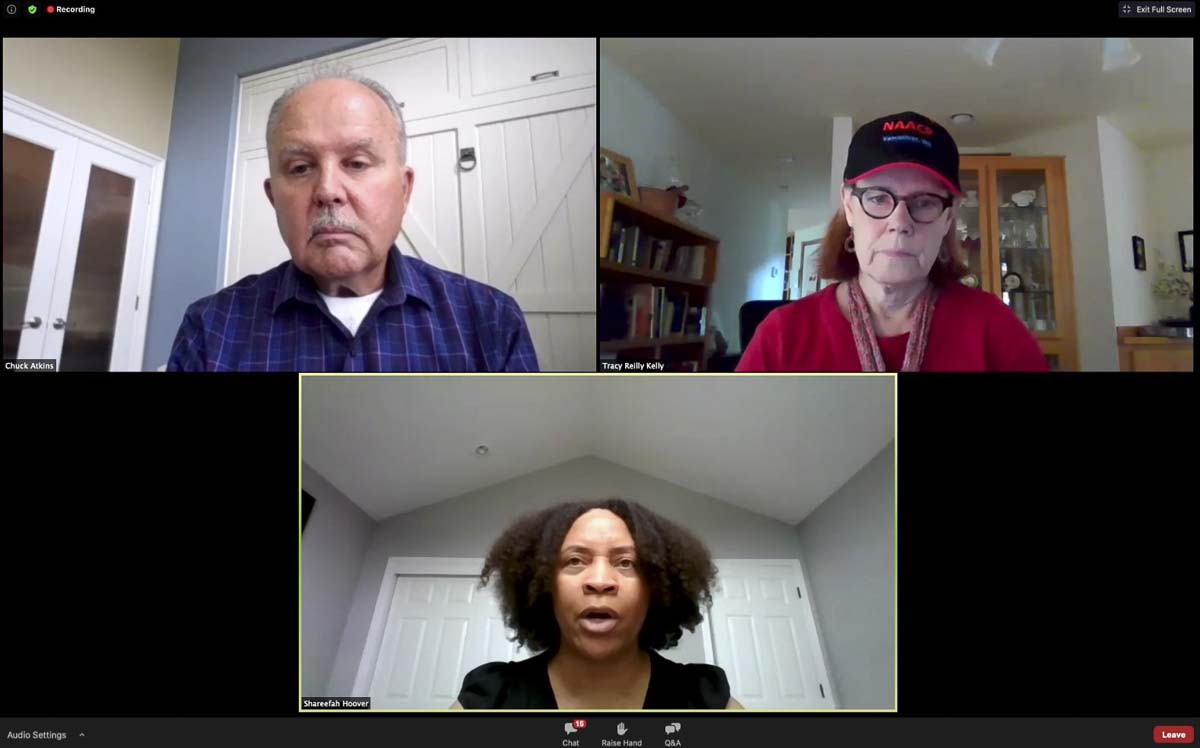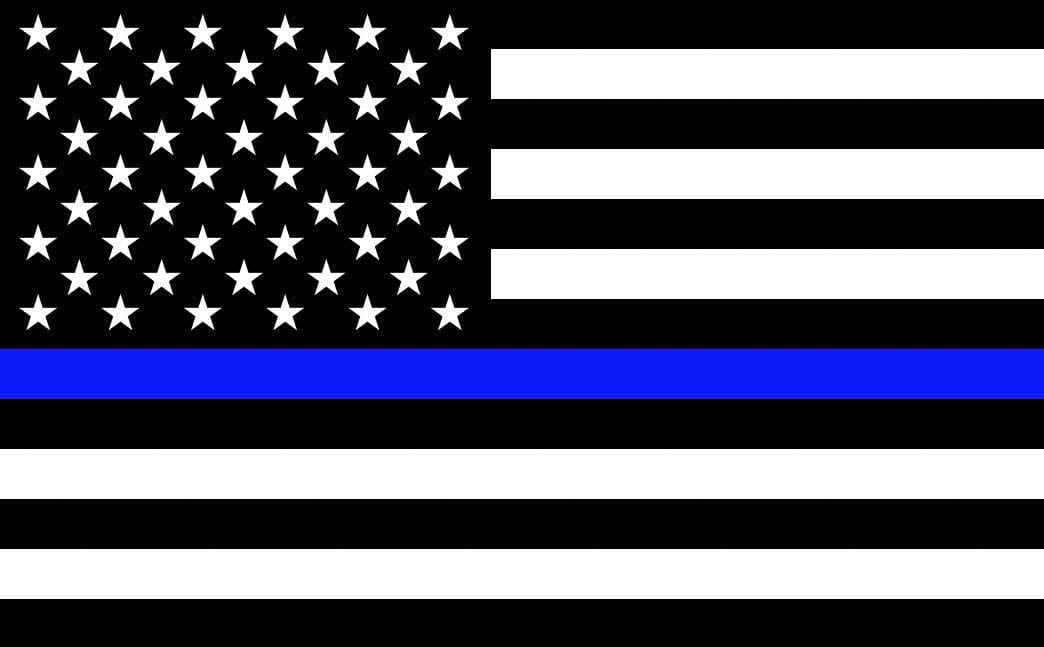Saturday’s webinar Q&A with sheriff saw removal of all “Thin Blue Line” stickers from CCSO vehicles, uniforms and offices
VANCOUVER — On the 155th anniversary of the official freeing of all slaves in America, known as Juneteenth, the conversation around complete freedom for African Americans is still being had by the National Association for the Advancement of Colored People (NAACP).
This past Saturday, the day after Juneteenth, the Vancouver NAACP held their annual celebration virtually due to COVID-19. The theme, inspired by the recent in-custody deaths of black men and women across the country, was “We Are Done Dying.”

In addition to commemorating the day and those who have died, the NAACP also conducted a Q&A time with Clark County Sheriff Chuck Atkins, about law enforcement and communities of color.
Opening the conversation, Vancouver NAACP President Bridgette Fahnbulleh read from the actual language of the declaration freeing the last slaves in Texas. Vice President Jasmine Tolbert then introduced Pastor Mark Westbrook for an opening prayer.
“We do not have the full right to live in this country. We will change that,” Fahnbulleh said. “Business as usual may cost us our livelihood or lives. We will change that. We are done dying. This last cry for life is heard around the country and around the world.”
After a reading from Maya Angelo’s “I Know Why the Caged Bird Sings” by planning committee member, Jan Berenger, the Q&A with Sheriff Atkins began with an introduction by Shareefah Hoover, chair of the legal redress committee.
“We felt that choosing this theme would be powerful,” Tolbert said. “It also spoke ever so perfectly to our current events. This campaign is asking for reform in multiple areas such as criminal justice, health, voting and economic justice.”
Among the key issues discussed by Hoover and Atkins were how the Clark County Sheriff’s Office (CCSO) could improve relationships and trust with communities of color, how CCSO can update and improve their policing tactics, including use of force situations and the need for weapons in policing.
Sheriff Atkins responded in great length to all questions posed by Hoover and questions submitted by members of the community. The central message from the sheriff was one of sympathy, assuredness and an expressed desire to further communication with the NAACP and communities of color in Clark County.
Pivotal to the trust and relations questions was the inquiry into CCSO’s ability to deescalate suspect interactions without use of force, especially when dealing with an individual suffering from a mental health issue.
“Do you believe that the Clark County Sheriff’s Office is in a better position now in terms of dealing on scene with incidents that may involve a mental health crisis than say a year ago or two years ago?” Hoover asked.
“We’re asking questions now before we ever get the call, so that we have more information about what we might be walking into,” Atkins said. “If we know that there’s a mental health problem, then we have ways that we can approach and do things. When we don’t know, we don’t know until the fight’s … happening in front of you. So that’s critical. I think we are in a much better place.”
From there, Hoover pivoted to questions regarding use of force, which has been on display locally in several police-involved-shootings in the last year, with CCSO and Vancouver Police Department.
“In just over a year local law enforcement officials have been involved in the shooting deaths of four civilians, representing minority immigrant homes or other marginalized people,” Hoover said. “How will you help reduce local deadly police violence that appear to disproportionately affect the disenfranchised?”
Atkins explained how CCSO is voluntarily reviewed by The Commission on Accreditation for Law Enforcement Agencies (CALEA) each year and has consistently for over 30 years met their “gold standard.” CCSO is the only Washington law enforcement agency accredited by CALEA, according to Atkins.
“Part of that is a robust Internal Affairs Division,” Atkins said. “We deal with every complaint, whether anonymous or not, and we deal with them at different levels. Any use of force must be recorded in an official police form. It is an early warning system that says, ‘Hey, Deputy so-and-so, who has had no complaints for three years, all of a sudden has had three complaints,’ let’s say. It sends a message to us to say, ‘Hey, you better find out what’s going on because this isn’t the norm.”
Towards the end of the webinar, Atkins spoke to an announcement he made to all employees of his agency late last week. In an effort to eliminate stumbling blocks in the road to better communication with communities of color, all “Thin Blue Line” decals and symbols were ordered removed from all CCSO vehicles, uniforms and office spaces.

The symbol, most often seen as the American flag with a single blue stripe down the middle, was used by Atkins and many CCSO deputies to signify solidarity with law enforcement officers killed in the line of duty.
From the NAACP and Black Lives Matter perspective, the symbol was seen as synonymous with the “Blue Lives Matter” movement and disconnected to the plight of people oppressed by racism. Multiple complaints resulted in Atkins’ decision, he said.
“The thin blue line to me was to represent fallen officers of all color, of all races, of all genders,” Atkins said. “I proudly supported that. I firmly believe that I will always support that. But I’m not going to let that little sticker be the divide amongst people in the community. If they’re truly afraid to come to us because of that, I will remove that sticker. We’re still the same people. So I hope that the actions that they see that we take is one that says we want to be part of the solution.”
Hoover and others thanked the sheriff for his decision, saying they felt it to be “truly right.”
Later, Atkins was asked whether or not firearms were a necessary asset to police and “didn’t they escalate situations.”
“No, it does not escalate, and yes, it is necessary,” Atkins said. “There are violent people out there every day that are looking to harm you, me and everybody else. It’s unfortunate, but it’s fact. In the middle of a carjacking or a home invasion, you don’t want a deputy showing up with a sharp tongue and a pen in his pocket. And I can tell you 41 years as a police officer, 25 of it in special operations, I have never, ever pulled the trigger on a human being. We hope we never have to do that.”
For more information and to request a link to view the full convesaron and future webinars, visit Vancouver NAACP online. For more information about the Clark County Sheriff’s Office, visit them at their website.




